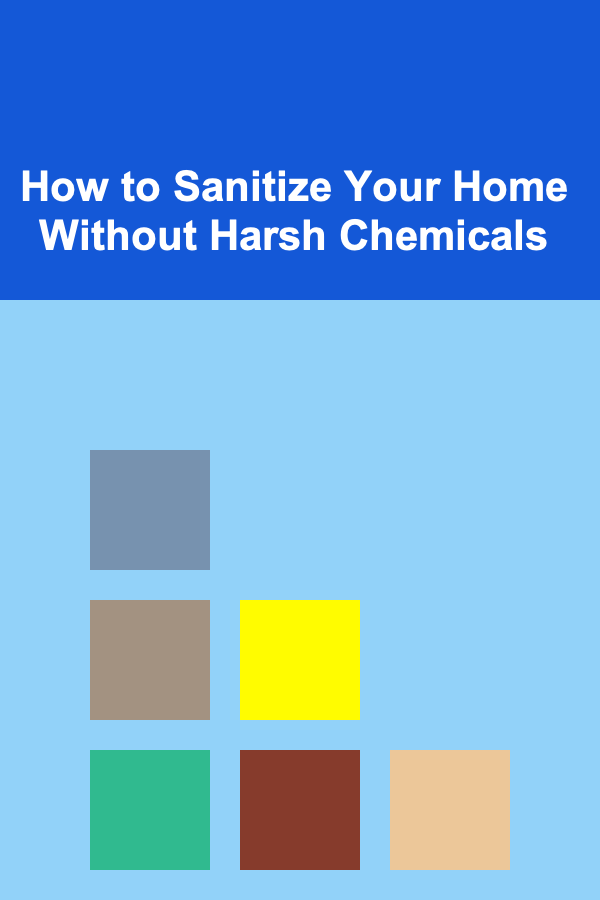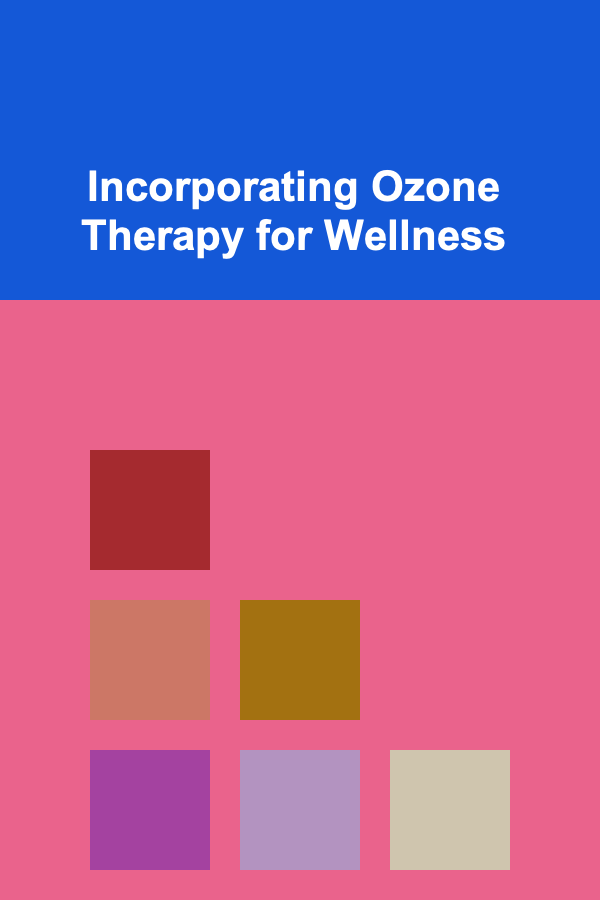
How to Sanitize Your Home Without Harsh Chemicals
ebook include PDF & Audio bundle (Micro Guide)
$12.99$8.99
Limited Time Offer! Order within the next:

Sanitizing your home is a vital step in maintaining a healthy and clean environment, but many store-bought cleaners are filled with harsh chemicals that can be harmful to both your health and the environment. These chemicals may cause skin irritation, respiratory problems, or contribute to pollution when they enter our water systems. Fortunately, there are natural, non-toxic alternatives that can help sanitize your home effectively without using harmful substances.
In this article, we'll explore various eco-friendly and safe cleaning methods to sanitize your home without resorting to harsh chemicals. We will cover simple techniques, ingredients, and tools that are effective, sustainable, and safe for families, pets, and the environment.
Why Avoid Harsh Chemicals?
Before diving into alternative sanitizing methods, it's important to understand why many people choose to avoid harsh chemicals in their cleaning routines.
Health Risks of Harsh Chemicals
Many conventional cleaning products contain chemicals like bleach, ammonia, and phthalates, which can be harmful to human health. Prolonged exposure to these chemicals can cause a range of health issues, including:
- Respiratory problems: Inhalation of chemical fumes can irritate the lungs and lead to breathing difficulties, especially for children, the elderly, or those with pre-existing respiratory conditions like asthma.
- Skin irritation: Harsh chemicals can cause rashes, burns, or allergic reactions, especially with frequent exposure or accidental contact.
- Endocrine disruption: Some chemicals in cleaning products, such as phthalates and triclosan, have been linked to hormone disruption, which can affect the reproductive system and overall health.
- Eye damage: Chemical cleaners, especially those with ammonia or bleach, can cause significant damage if they come into contact with the eyes, leading to burns or long-term eye problems.
Environmental Impact
Not only can these chemicals harm our health, but they also contribute to pollution. When rinsed down drains, many chemical cleaning products end up in rivers, lakes, or oceans, polluting the water supply. Some chemicals, like phosphates in detergents, contribute to the process of eutrophication, which can harm aquatic ecosystems.
Ethical Concerns
Many cleaning products are tested on animals, causing unnecessary harm to animals in the process. By switching to natural, cruelty-free alternatives, you are making a more ethical choice for the well-being of animals.
With all these factors in mind, the desire to sanitize your home without using harsh chemicals is understandable. Fortunately, there are plenty of safe, natural, and effective alternatives to get the job done.
The Basics of Natural Home Sanitization
What You'll Need
Here's a list of natural products that can replace the toxic cleaners in your home:
- Vinegar: White vinegar is one of the most versatile natural cleaning agents available. It is mildly acidic, which helps break down dirt, grime, and bacteria.
- Baking Soda: This gentle abrasive is perfect for scrubbing surfaces, removing stains, and neutralizing odors.
- Lemon: The citric acid in lemon juice has natural antibacterial and antiseptic properties. Plus, it leaves a fresh scent.
- Essential Oils: Oils like tea tree, lavender, eucalyptus, and peppermint have antimicrobial properties and can be added to homemade cleaning solutions for fragrance and enhanced effectiveness.
- Castile Soap: A gentle, plant-based soap that works well for cleaning surfaces, dishes, and even body care.
- Hydrogen Peroxide: A non-toxic disinfectant, hydrogen peroxide is excellent for sanitizing surfaces and removing stains.
- Water: Simple tap water or distilled water is a crucial component of many natural cleaning solutions.
Tools for Cleaning
- Microfiber Cloths: These cloths are highly absorbent and efficient for cleaning surfaces without leaving streaks.
- Spray Bottles: These are useful for creating and storing your homemade cleaning solutions.
- Scrub Brushes: A good scrub brush, especially one with stiff bristles, is essential for tackling stubborn dirt and grime.
Natural Cleaning and Sanitizing Solutions
1. All-Purpose Cleaner
An all-purpose cleaner can be used on most surfaces, including countertops, sinks, and stovetops. A natural all-purpose cleaner can be made by mixing:
- 1 cup of water
- 1 cup of white vinegar
- 1 tablespoon of baking soda
- 10-15 drops of essential oils (optional for fragrance)
This solution works well for sanitizing and deodorizing surfaces. The vinegar cuts through grease and grime, while the baking soda helps with scrubbing. The essential oils provide a pleasant scent and additional antimicrobial benefits.
2. Disinfectant Spray
If you're looking for a more powerful disinfectant, you can use hydrogen peroxide, which has been proven to kill a wide range of germs, bacteria, and viruses. To make a natural disinfectant spray, combine:
- 1 cup of hydrogen peroxide (3% solution)
- 1 cup of water
- 10 drops of essential oils (e.g., tea tree or lavender for added antibacterial properties)
Spray this solution on surfaces like bathroom sinks, toilets, and doorknobs. Let it sit for a few minutes before wiping it away to ensure it kills harmful microorganisms.
3. Glass and Mirror Cleaner
For streak-free windows and mirrors, a combination of vinegar and water is the perfect solution. To create a DIY glass cleaner:
- 1 cup of water
- 1 cup of white vinegar
- 10 drops of essential oil (optional)
Mix these ingredients in a spray bottle and use a microfiber cloth to wipe the glass clean. The vinegar helps break down smudges and fingerprints, while the essential oils add a pleasant fragrance.
4. Floor Cleaner
For cleaning floors, especially tile or hardwood, a simple solution of vinegar and water can be very effective:
- 1 gallon of warm water
- 1/4 cup of white vinegar
If you want to add some extra cleaning power, you can also add a small amount of Castile soap. This mixture is effective at cutting through grease and dirt without leaving harmful residues. For more shine on hardwood floors, you can use a small amount of olive oil or lemon oil.
5. Kitchen Sanitizing Solution
The kitchen is one of the most important areas in your home to sanitize, especially since it comes into contact with food. A simple and effective cleaner for kitchen counters, appliances, and cutting boards is made with:
- 1/2 cup of vinegar
- 1/2 cup of water
- 1 tablespoon of baking soda
- 10-15 drops of lemon or tea tree essential oil
This solution helps sanitize surfaces, neutralize odors, and break down food residues. It is safe for most kitchen surfaces, but always spot-test on delicate materials.
6. Bathroom Cleaner
Bathrooms require frequent cleaning due to their exposure to moisture and germs. A natural cleaner can help sanitize sinks, tubs, and toilets without harsh chemicals:
- 1/2 cup of baking soda
- 1/4 cup of Castile soap
- 1/4 cup of water
- 10 drops of essential oil (eucalyptus or lavender work well)
Combine these ingredients into a paste and use it to scrub tubs, tiles, and sinks. For toilets, pour a small amount of this paste into the bowl and scrub with a toilet brush. You can also add vinegar to the toilet bowl for additional sanitizing power.
7. Deodorizing Air Freshener
Traditional air fresheners often contain synthetic chemicals that can harm your health and the environment. A simple, natural air freshener can be made using essential oils. To create your own air freshener:
- 1 cup of water
- 1 tablespoon of vodka (optional)
- 10-15 drops of essential oil (lavender, lemon, or eucalyptus)
Simply mix these ingredients in a spray bottle and spritz the air as needed. The essential oils will neutralize odors while providing a refreshing fragrance.
Tips for Effective Home Sanitization Without Chemicals
While the natural solutions mentioned above are effective, there are additional tips to ensure the most thorough sanitization:
1. Regular Cleaning Routine
The key to keeping your home sanitized is a regular cleaning routine. Spot clean surfaces every day to remove germs and dust. Perform deeper cleans, such as sanitizing bathrooms and kitchens, on a weekly basis. Clean high-touch areas like door handles, light switches, and remotes regularly to prevent the spread of germs.
2. Use Proper Sanitizing Techniques
Sanitizing is more than just wiping surfaces down. To ensure that germs are effectively removed, make sure to:
- Apply your cleaning solution generously to the surface.
- Allow the solution to sit for a few minutes to give it time to break down dirt and kill germs.
- Wipe down surfaces with a clean, dry cloth to remove any excess moisture or residue.
3. Declutter Your Home
A clean home is easier to sanitize. Decluttering your home ensures that dust and dirt don't accumulate in hard-to-reach areas. It also makes the cleaning process faster and more efficient.
4. Use Natural Fabrics
Whenever possible, use natural fabrics like cotton, hemp, or bamboo for cleaning. These materials are biodegradable and free from synthetic chemicals, unlike some synthetic cloths that can shed microplastics when washed.
5. Ensure Good Ventilation
Proper ventilation is key when cleaning any space. Open windows or use fans to improve airflow, allowing cleaning solutions to evaporate more quickly and preventing the buildup of fumes.
Conclusion
Sanitizing your home without harsh chemicals is not only possible, but it's also healthier for you, your family, and the environment. By incorporating natural ingredients like vinegar, baking soda, and essential oils into your cleaning routine, you can achieve a spotless, sanitized home without relying on toxic substances. These eco-friendly alternatives are just as effective as commercial cleaners, if not more so, and they are often less expensive and easier to make.
By making simple switches to non-toxic cleaning solutions, you are contributing to a healthier living environment, minimizing exposure to harmful chemicals, and helping protect the planet. It's time to embrace a natural approach to home sanitization that supports your health and well-being while keeping your space clean and fresh.

How to Clean and Maintain Your Home's Ventilation System
Read More
How to Design a Stunning Rose Home Christmas Tree
Read More
How to Diversify Your Investment Portfolio for Maximum Returns
Read More
The Customer Service Representative's Playbook: Building Customer Loyalty and Satisfaction
Read More
How to Understand the Role of Gut Health in Weight Loss
Read More
Incorporating Ozone Therapy for Wellness
Read MoreOther Products

How to Clean and Maintain Your Home's Ventilation System
Read More
How to Design a Stunning Rose Home Christmas Tree
Read More
How to Diversify Your Investment Portfolio for Maximum Returns
Read More
The Customer Service Representative's Playbook: Building Customer Loyalty and Satisfaction
Read More
How to Understand the Role of Gut Health in Weight Loss
Read More